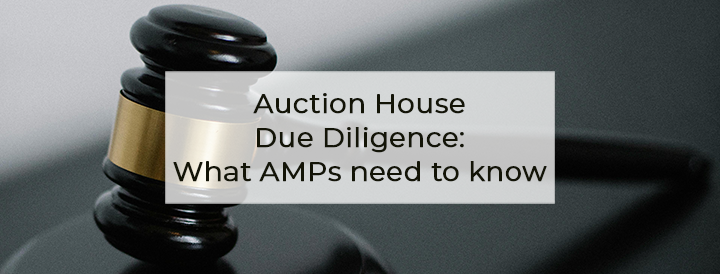- July 7, 2024
- Posted by: FCS Compliance
- Category: Art Market, Blog

Auction House Due Diligence: What Art Market Participants (AMPs) need to know
How does Due Diligence work for Auction Houses?
The answer is the same for nearly every anti-money laundering question; it depends – mainly on the scenario. Key factors that govern the answer include; whether the AMP is buying or selling art at auction, whether the AMP is acting for him/her/ itself or on behalf of a client, and whether auctioneers must provide due diligence information.
In the UK, to determine whether you must conduct due diligence, you must first identify who is your customer in the particular transaction. According to the specific art market guidance provided by His Majesty’s Treasury, the customer is the person paying the art market participant for art or services. This rule applies whether one is transacting at a public auction or privately.
AMPs Buying at Auction
An AMP who buys stock at auction for its own account, is sadly not being paid by anyone, including the auction house. In this case, the auction house is not the customer, rather the AMP is the auction house’s customer. The auction house should be conducting due diligence on you the buyer, who is the customer paying the house for both art and service. Of course, whenever one transacts, one has the eternal concerns of title, sanctions, bans, etc.
If the art market participant successfully bids at auction on behalf of a collector, who is paying the AMP a fee for the service, then the collector is the customer. As such, the AMP is required to conduct due diligence on its collector/ customer, who is paying the AMP. Conducting proper, complete due diligence is an important and essential obligation imposed by the UK ML regulations. Incomplete or non-existent due diligences subjects AMPs to serious risks.
AMPs Consigning at Auction
Conversely, when an AMP consigns an item of stock to an auction house, the auctioneer pays the AMP net sale proceeds, making the auction house the AMP’s customer. As a customer, the AMP has to conduct Due Diligence on the Auction House. Of course, if the AMP is consigning a work of art as an agent for a collector/ client who is paying the AMP, the AMP must also do due diligence on the collector/ client. In such cases, there are two customers, the auction house and the client/ collector on whose behalf the AMP is consigning.
Auction House Due Diligence
A common question we hear in training and on our hotline is “Do I really need to do due diligence on well known, well respected public companies who have been around for 100+ years?”. The short answer is yes, if the auction house is the customer, one needs to conduct due diligence on customers. There is nothing special about being an auction house that relieves them from this obligation.
The issue is specifically addressed in UK ML Regulation 39. The Regulation is quite clear that “upon request” corporations must provide Due Diligence, unless the entity is listed on a regulated market. The specific information the company must provide includes:
- The company’s name, registered number, registered office, and principal place of business.
- Information about its board of directors or equivalent management body, senior persons responsible for its operations, the law it is subject to, its legal owners, and its beneficial owners.
- Its articles of association or other governing documents.
In addition to the above obligations, in its art market guidance, HM Treasury explains that most UK entities are required to maintain up-to-date information on individuals with significant influence and control over them (“Persons with Significant Control”). This information should be provided directly to the AMP from the Company. The AMP should then double-check for consistency the information the company provides to the AMP against the Persons with Significant Control information listed publicly on Companies House.
In summary, Due Diligence is necessary for your direct customers. You must, on a case-by-case basis, determine who your customers are and then conduct your appropriate Due Diligence. Even if the Money Laundering Regulations do not require Due Diligence as an obligation on a particular transaction, there are still certain permanent risks such as title, sanctions and bans that remain crucial to address.
Article written: July 2024

